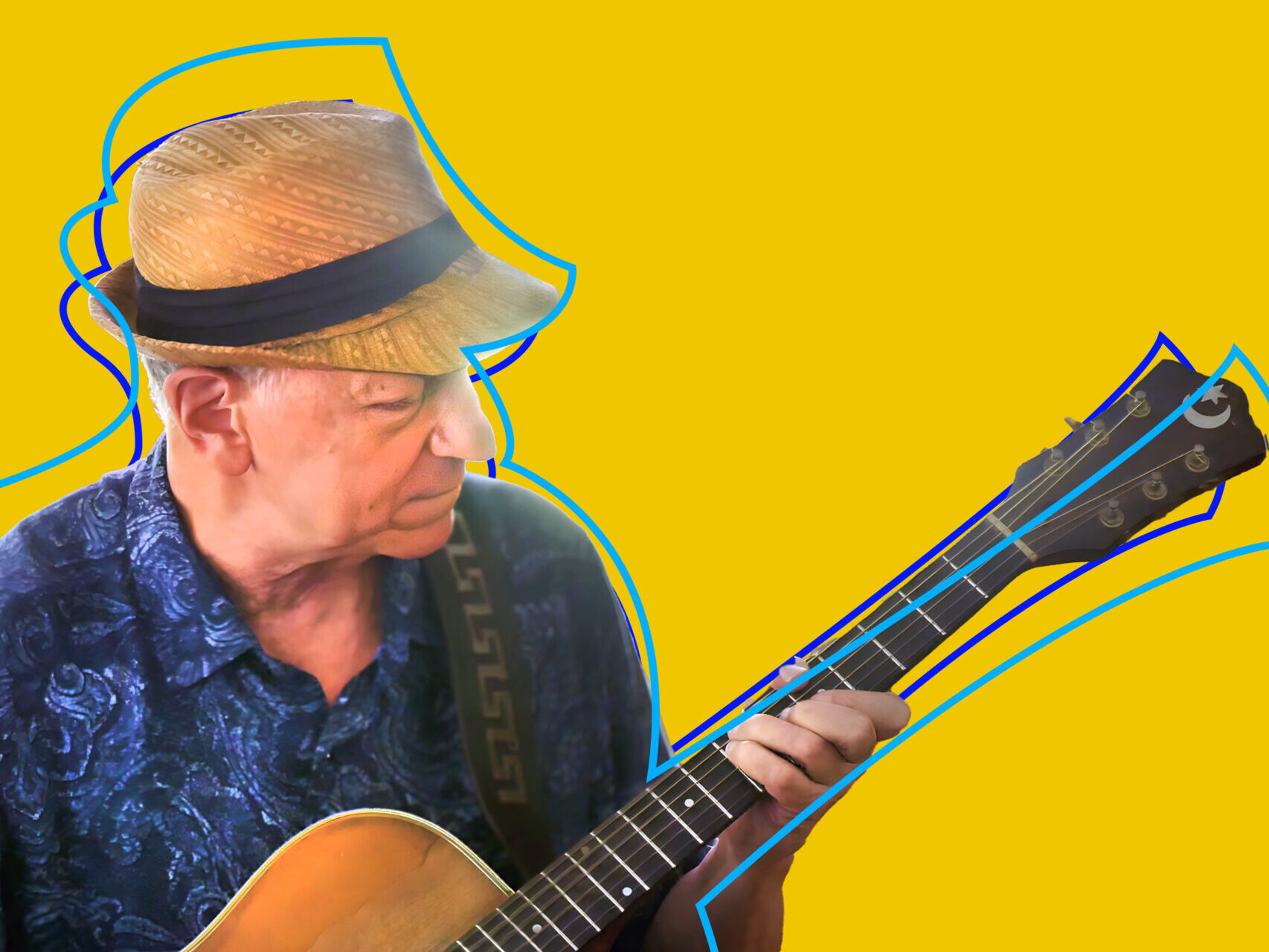The neighbor who always makes you laugh
Writing by Gia Miller
Design and Photography by Justin Negard
Everybody wants his hat. And people ask for it so often that it inspired Katonah resident Marc Black to write a song and name his pandemic album “Everybody Wants My Hat.” The song features verses of spoken word and a chorus sung only with the accompaniment of his trusted companion Claudette, a 55-year-old Guild D-40 guitar. Black’s music video, which he filmed in his living room in 2019, includes someone attempting to steal said hat right off his head. Black—a singer and songwriter whose music spans the genres of folk, blues, funk, and experimental soundscapes, and his music can also be heard in films and commercials—began making records and performing with notable musicians like The Doors, Neil Diamond, and Van Morrison starting at 17 years old.
Black’s experiences in the music industry range from landing his first record deal as a high school student for his 1960s boy group called The Blades of Grass (they had a Top 10 hit) to his 2011 song “I Love You Rachel Maddow” being purchased and performed by The Late Show with Stephen Colbert this past May. He’s performed on top of a bus to protest fracking, scored music for animated ants and IKEA, was inducted into the New York Blues Hall of Fame in 2014, and holds a key to the city of Woodstock. Regardless of the song or the topic, Black’s humor and passion drive his work.
Elvis & a boy band
When Black was five years old and living in Jacksonville, FL, he heard a song that changed his life. “I recall riding down the road with my mom in our yellow Studebaker, and something came on the radio,” he says. “I turned to my mom and said, ‘What is that? And no, I didn’t say, ‘Who is that?’ I said, ‘What is that?’ She said, ‘Well, Marc, that’s rock and roll.’ I responded, ‘I want some of that.’” And he got it. Black’s parents bought him a $6 guitar, which made him feel “like a million bucks.” Black didn’t know how to play, but he didn’t care. “I worked on my Elvis moves,” he remembers. “That sounds ridiculous, doesn’t it? A six-year-old doing Elvis moves? I got so into the music that I had to understand every little detail. And if there was a defect in the record, like a skip, I learned to sing the song with that defect.”
Black took several guitar lessons, but “it didn’t really take.” However, he could strum a few notes and hold the guitar correctly, and at that time, it was enough. As he got older and listened to more rock and folk music, he mostly taught himself how to play, and he began writing music.
During early high school in New Jersey, Black and three friends formed a singing group they called The Furnace Men because they rehearsed in a basement used solely to store coal. They sent a demo to a record label and landed a deal. “The producers renamed us The Blades of Grass, which was a lyric from a song I wrote called ‘Just Ah,’” he remembers. “They called the album ‘The Blades of Grass Are Not for Smoking,’ which is funny because we didn’t even know what pot was.” Their song “Happy” became a Top 10 hit in about half the country. “We didn’t write the song, and another group in California sang a version of it as well,” Black explains. “We rose higher in the charts, but because we were two bands singing the same song, nobody had enough oomph behind their sails.” The group disbanded when they went to college, but Black, who majored in music, philosophy and religion at Colgate University, continued to perform.
Black’s second record deal was with RCA. “The deal crashed and burned because everybody I was working with got fired, so that was really upsetting,” Black says. “The album was never finished, but somehow I was listening to Spotify a couple of months ago, and I found the unfinished record I made with RCA under my name with a fake album cover; it says it was released in 1972. It’s not the best album in the world, but it was okay; it would have been better if we’d had a chance to finish it.”
A working musician
Black, who says being a working musician can be challenging, has composed and produced numerous albums throughout his career and found commercial success in music and sound design through his music production company, Black Market Productions. “I’m really proud of these animated videos,” he says. “They were for a Nickelodeon show called Antics, about dancing ants.” He’s also scored commercials for major brands like IKEA and nonprofits like Make-A-Wish, along with an episode of Sex and the City.
One of his career highlights was writing music for the Los Angeles Dodgers. “I was a Dodgers fan as a kid, and this creative director knew that, so he asked me if I wanted to do some music for the Dodgers,” Black explains with a smile. “I got a big kick out of that. I went down to Vero Beach, where they had their spring training at the time, and I met all the Dodgers and hung out with them.” Later, he wrote for the Mets, and his music was “in between every inning for two years.” They paid him in box seats.
But what he’s most proud of is his political work. “I did a lot of work around fracking, and I wrote a song called ‘No Fracking Way,’ which got quite a bit of play,” Black says of his song that includes a chorus with phrases like “no fracking way” and “don’t frack with me.” In 2012, Black and several musicians, along with a puppet show and a women’s a cappella group, drove through Pennsylvania on a rented bus, parking and performing on the bus’s roof to lift residents’ spirits. “They’d been abandoned and felt so thankful,” he remembers. He’s also performed with Pete Seeger several times, which he says “felt really clean and really good.”
Today, Black is really “trying to come up with music that will give people the courage to save our country. That means different things for different people, but we all have a job to do. There’s a song I wrote a while ago that I want to redo. It’s called ‘Born Again American.’” Then he breaks into song. “Born again American, you know I love this land. You can be what you were born to be, Black, white, woman or man.”
To learn more about Marc Black and the other musicians featured in this series, check out our podcast, available on Spotify.
This article was published in the July/August 2025 edition of Connect to Northern Westchester.









